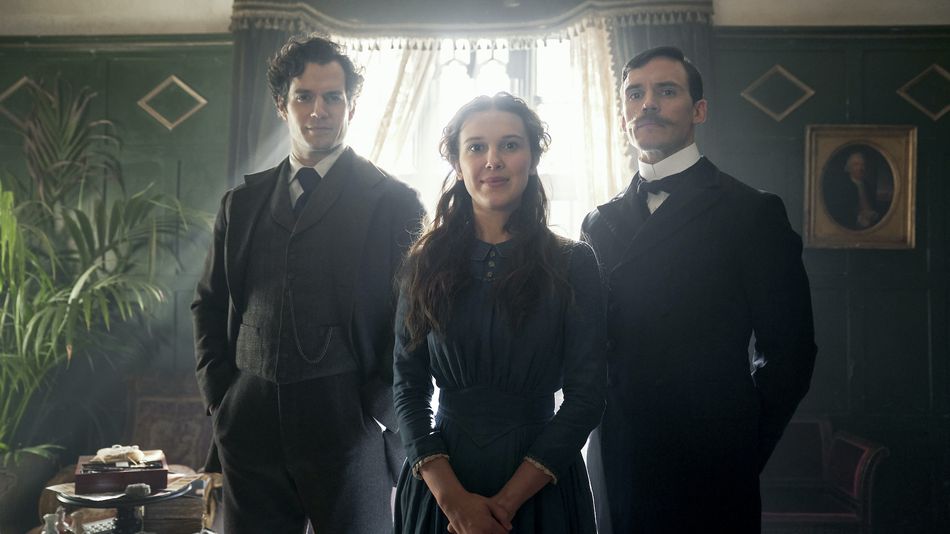
Image: ROBERT VIGLASKI / LEGENDARY
In addition to writing the famous Sherlock Holmes stories, Sir Arthur Conan Doyle was a fervent believer in fairies, seances, and real-life magic. Yet even with his prodigious imagination, Doyle could not have dreamed up a character like Enola Holmes. Enola, the main character of the eponymous Netflix movie based on author Nancy Springer’s The Enola Holmes Mysteries, is a plucky 16-year-old girl whose blood relation to Doyle’s famous detective is a footnote in her own adventure: Her mother is missing, there’s a marquess on the run, and with Enola on the case the game is most certainly afoot.
The dual mysteries at the heart of Enola Holmes are compelling despite creating more than a few plot holes that, while small, poke at the story’s credibility as a classic whodunnit. Jack Thorne’s script touches on many aspects of Victorian life, including gender roles, reform politics, family dynamics, and secret societies, and winds up saying very little about all of them. The story moves quickly enough to smooth over most of those bumps, however, and is especially fun when the audience lets Enola do most of the thinking.
Millie Bobby Brown stars as Enola and imbues her with likable cleverness and funny, fourth-wall-breaking energy. Her dedication to making the audience love Enola feels connected to the sense of ownership Brown has over the character, considering that she was instrumental in bringing the Enola Holmes book series to her family’s production company for adaptation. Brown plays the character she brought to the screen through her own hard work and star power as if she and Enola are having the time of their lives. Her enthusiasm is infectious.
Less good and more confusing is Henry Cavill as Sherlock Holmes, who plays the iconic character with the affect of an unrelated man whose parents named their large, handsome son after a famous detective. His inclusion in the story is necessary because of Enola Holmes’ connection to the original intellectual property, but his chill, suave vibes are so unlike Sir Arthur Conan Doyle’s creation that the film would almost make more sense if Enola’s brother was not Sherlock Holmes at all, but a random Victorian-era gentleman with an odd little sister. That would have spared the audience the expectation that he’d do something Holmesy at some point; luckily, Enola is interesting enough on her own.
Less good and more confusing is Henry Cavill as Sherlock Holmes, who plays the iconic character with the affect of an unrelated man whose parents named their large, handsome son after a famous detective.
Enola’s story is reminiscent of many mid-to-late-’00s young adult fiction protagonists — she is an adventurous, smart, and independent woman in a world where those traits are not valued in her gender. The movie acknowledges Enola’s era in several sequences where she dresses as a boy in order to move undetected through society, as well as in the motivations of her other brother Mycroft (Sam Claflin), who insists that Enola’s wild upbringing in the countryside be stamped out by sending her to a finishing school. Unfortunately, the script’s focus on Enola being different to proper young ladies falls into a regrettable “not like the other girls” trope, where Enola’s spirit shines only in comparison to imagined legions of dull, uninteresting 16-year-olds who enjoy silly girl things like embroidery and fashion.
That trope could perhaps have been subverted if Enola Holmes had a larger cast of women characters (or any other girls Enola’s age), but every other woman in the movie is either an elderly, traditionalist nightmare or a norm-bucking maverick. The talented Susie Wokoma is underused as Edith, a butt-kicking teahouse owner whose role in the story is largely (and disappointingly) irrelevant, and aside from Enola’s mother every woman over 40 is a stereotypical and traditionalist harridan. In Doyle’s stories, Sherlock Holmes has a palpable disdain for women. Enola Holmes could have done more to subvert his antiquarian attitudes.
The Enola Holmes Mysteries are a six-book series and Enola Holmes on Netflix only adapted the first of them. Brown is charming enough to carry a streaming film franchise on her back, and if later films allow the character to grow beyond the idea that other girls are vaguely gross, then Enola may become one of Netflix’s more valuable properties. For anyone looking for a fun, mindless mystery carried by a character they wouldn’t mind seeing again, the story of the much cooler Holmes sibling is absolutely the way to go.
Enola Holmes is now streaming on Netflix.
